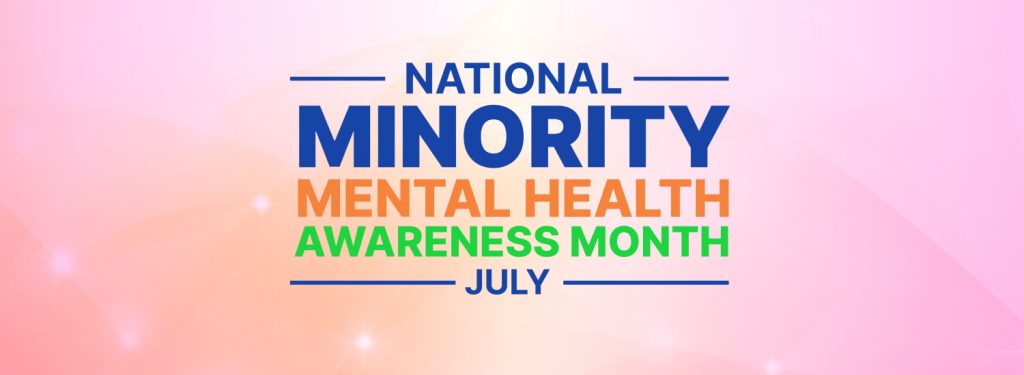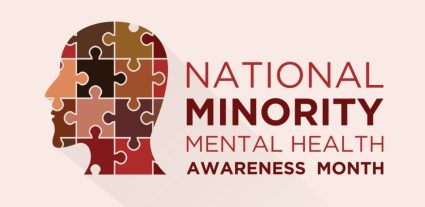July is Minority Mental Health Awareness Month!
in Local Events, Local News, Massachusetts News, National News

July is National Minority Mental Health Awareness Month
National Minority Mental Health Awareness Month, observed every July, aims to raise awareness about the unique mental health challenges faced by racial and ethnic minority groups in the United States. Established in 2008, this month honors the legacy of Bebe Moore Campbell, an advocate who worked tirelessly to address mental health disparities in underserved communities.
The observance focuses on promoting mental health equity by highlighting the systemic barriers that minorities often encounter, such as stigma, lack of access to care, and cultural misunderstandings. It encourages open conversations about mental health, educates communities on recognizing mental health conditions, and provides resources for support and treatment.
By fostering understanding and support, National Minority Mental Health Awareness Month aims to create a more inclusive and equitable mental health landscape for all.
Who is Bebe Moore Campbell 
Bebe Moore Campbell was an influential African American author and mental health advocate whose work had a profound impact on minority communities. She shed light on the complexities of mental health, particularly within the African American community, and the effects of racism.
She co-founded NAMI Urban Los Angeles and became a national change agent, revolutionizing the approach to mental health in underserved communities. She understood the harmful effects of stigma and silence, which often led to a lack of mental health care and treatment within communities of color. Campbell advocated for the destigmatization of mental illness and the creation of inclusive resources for support and mental health care.
Her efforts culminated in the establishment of the Bebe Moore Campbell National Minority Mental Health Awareness Month, recognized every July. This initiative aims to improve access to mental health treatment and services and promote public awareness of mental illness, especially among underserved communities. Campbell’s legacy continues to inspire movements for parity, inclusion, and a health justice ecosystem that is empathetic and culturally sensitive. Her work remains a beacon of hope and change, encouraging open conversations and better support systems for mental health in minority populations.
Deeper dive into the issue:
- Compared to those of other racial/ethnic backgrounds, non-Hispanic Asian American adults with mental illness are least likely to receive mental health treatment — only 36.1% of Asian adults with a mental illness received treatment in 2022.
- Only 37.9% of non-Hispanic Black or African American adults with mental illness received treatment in 2022.
- Black people are more likely to receive a misdiagnosis of schizophrenia when expressing symptoms related to mood disorders.
- Nearly half of Hispanic or Latino young adults ages 18-25 with serious mental illness do not receive treatment.
- Many children of undocumented immigrants are eligible for health insurance under the Affordable Care Act, but families may be either unaware of this or afraid to register due to fear of separation.
What you can do to support minority mental health:
- Educate Yourself and Others: Learn about mental health issues and their impact on minority communities. Share this knowledge with family, friends, and colleagues to foster understanding and empathy.
- Promote Mental Health Equity: Advocate for policies and practices that ensure equal access to mental health resources for all, regardless of race, ethnicity, or socioeconomic status.
- Support Culturally Competent Care: Encourage healthcare providers to receive training in cultural competence to better understand and meet the unique needs of minority patients.
- Engage in Community Outreach: Participate in or organize community events that focus on mental health awareness.
- Use Inclusive Language: Talk about mental health using non-stigmatizing language and educate others about the importance of doing so to create a more supportive environment.
- Address Implicit Bias and Microaggressions: Learn about and work to avoid unconscious biases and subtle acts of discrimination that can have a negative impact on mental health.
- Support Mental Health Organizations: Donate to or volunteer with organizations that work to improve mental health services for minority populations.
- Provide Resources: Share information about free and confidential resources like the 988 Suicide & Crisis Lifeline, which can offer immediate help.
Resources

Naming Your Strengths: A free online resource to help recognize your own strengths and understand how they can help your own mental health.
Healing Traditions: A free online resource to help understand how your traditions and culture can help to support your healing and mental health.
Quick tips: Actions for improving mental health in communities of color
Here you’ll find a list of resources, including hotlines, partner organizations, and expert
information from Mental Health America to help you or a loved one as you work on your mental
well-being.
Learn more about Minority Mental Health Month, check out resources, and join your community in breaking the stigma!
